Hybrid Efficiency – AWD Confidence
Clean Fleet Report likes when a car manufacturer checks all the boxes. In the case of the 2017 Nissan Rogue Hybrid AWD, they ticked off fuel economy and multi-surface driving capability in a stylish compact crossover. We rated the 2015 and 2016 Rogue highly and were excited to learn that the hybrid version would be added to the line-up.
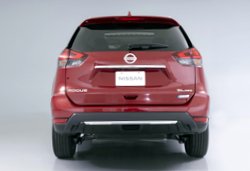
Nissan already had a popular crossover in the Rogue, so much so that it has become their top selling model. Knowing the public was connecting with the Rogue, making any changes had better be needed improvements. Increasing the Rogue’s fuel economy by adding a hybrid is far more radical than just hanging some new sheet metal and offering a better sound system. So good for Nissan offering consumers more choices.
The 2017 Nissan Rogue Hybrid AWD comes with a 2.0-liter, four-cylinder engine with direct fuel injection. Running on regular fuel, it puts out 141 horsepower (hp) and 144 pounds-feet (lb-ft) of torque. Add in the 30kW electric motor for a total system output of 176 hp. The Xtronic continuously variable transmission (CVT) has two drive modes—Eco and Sport—and helps deliver an EPA rating of 31 city/34 highway/33 combined. In 433 miles of 70-percent highway/30-percent city driving we averaged 32.2 mpg. For comparison, the non-hybrid Rogue AWD with the 2.5L gasoline engine has an EPA fuel economy rating of 25 city/32 highway/28 combined so the hybrid offers an 18 percent improvement.
It is important to note that the fuel economy numbers reported by Clean Fleet Report are non-scientific. They represent the reviewer’s driving experience, but should be similar to most drivers living in our reviewer’s cities. If you live in extremely cold weather, high in the mountains or spend most of your time in the city or stuck in rush hour traffic, then your numbers will differ.
Hitting the Road
The CVT-equipped Rogue was, as I have found with other cars using CVTs, to be an overall good driving experience. Driving a car with no transmission shift-points (because there are no gears to shift) helps deliver increased fuel economy and reduces vibrations inside the cabin. The CVT and the 2.0L engine combination ran smoothly and quietly.
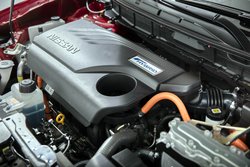
The 2017 Nissan Rogue Hybrid has automatic stop/start contributing to increased fuel economy. This feature turns off the gasoline engine at stop lights or when idling, then restarts when you release the brake pedal or step on the accelerator. The common complaint with such systems is that on many cars, when the engine restarts, it is accompanied by a jarring and clunking sound. This was not the case with Nissan’s system which, for the most part, had an unnoticeable transition between off and on.
Now that the car has restarted, this is where the Rogue Hybrid was a bit disappointing. Unless you are very light on the accelerator and are on a flat road, you will only be able to creep along in EV mode for less than a mile. Creep in this case means very, very slowly, so much so that cars behind you will not be pleased. Depressing the pedal even slightly kicks in the gasoline engine, so the beauty of driving in EV mode around town and achieving outstanding fuel economy is somewhat negated. The transitions between all-electric and gasoline were smooth, quiet and vibration free. Once to the desired speed, the Rogue Hybrid cruised and kept up with traffic easily. To get the most from the engine, you have choices of Eco and Sport settings. Eco can be used on long stretches of road to squeeze-out every last drop of fuel, but don’t expect exciting acceleration. The Sport mode holds the transmission in each rev band a bit longer, but again there will be no confusing the Rogue Hybrid with a sports car.
The ride is smooth, offering a feeling of security. We didn’t take the Rogue Hybrid AWD off-road to test the all-wheel capability, but experience has told us that for anything but rock or dune climbing or deep, deep snow drifts, you will appreciate the added traction when the roads get snowy and icy.
The hybrid system’s lithium-ion polymer battery is replenished through the regenerative charging system as well as charging from the engine. The regen technology converts kinetic energy into electric energy and stores it in the battery when applying the brakes or coasting. This process can be viewed on a dash gauge where you can watch the power flow into and out of the battery and electric motor.
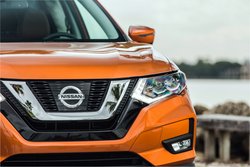
The regenerative brakes had solid stops with a system consisting of vented front and rear discs. Anti-lock brakes, brake assist, forward emergency braking are part of the system. Electronic brake-force distribution adjusts brake proportioning to compensate for added weight from passengers or cargo, and even adjusts as fuel is consumed. Nissan’s active engine braking works in-conjunction with the CVT, to slow the Rogue when braking while feeding energy to the battery, so there is less braking effort needed by the driver.
The five-door Rogue (four doors plus a motion-activated—kick sensor—liftgate) weighs in at 3,814 lbs., and has a 56/44 front-to-rear weight distribution. Handling and maneuvers are easy and confident, with Active Ride Control and the electric power-assisted steering providing good road feel. The little body roll through all cornering was aided by the Dunlop GrandTrek 225/60/18 all-season tires on 18-inch aluminum-alloy wheels.
Driving Experience: Exterior
Nissan says the 2017 Rogue has a “new progressive, emotive styling.†The Rogue is recognizable with a sporty and pleasantly aggressive stance, highlighted by the sculpted front end that features Nissan’s signature V-motion grill. The LED daytime running lights, fog lights and Halogen headlights, plus the LED turn signals in the exterior mirrors all added to a clean, expressive design. Nissan has worked on the aerodynamics to achieve a 0.33 drag co-efficient. Design of the outside mirror shapes, rear roof spoiler, combination rear lights that seem to be one, along with the fenders and rear hatch shapes, help the Rogue cut through the wind. There is just enough brightwork to play against the body color, which in our case was an eye-catching Palatial Ruby.
Driving Experience: Interior
Clean Fleet Report’s 2017 Nissan Rogue Hybrid AWD had the top-level SL trim. Interior appointments for the SL model begin with the heated leather-appointed front seats. The driver’s is six-way power adjustable while the passenger gets a four-way manually adjustable seat. Both front seats have Nissan’s Zero Gravity design where their articulated shape is designed to provide continuous support, comfort and reduced driver fatigue.
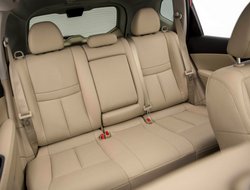
A third row for seven-passenger seating is an option on the non-hybrid Rogue. This is not available on the hybrid Rogue as the batteries take up the space for the third row. Nissan’s rear EZ Flex seating system is quite accommodating as the complete three-passenger second row slides and reclines, while having a center pass through as part of the folding armrest, giving 40/20/40 split flexibility. Make sure to put the rear seat through its paces when at your dealer.
Usually, at this point we suggest the rear seat really is only good for two adults, but this isn’t the case with the Rogue. With the rear seat slid-back the full nine inches, rear seat passengers have a very generous 37.9-inches of legroom. Nissan’s nifty Divide-N-Hide Cargo System can create a flat cargo area and, when the rear-most floorboard is opened, a deep cargo well is created to transport taller objects. With access through the motion-activated power liftgate, it is pretty clear you will not have any issues hauling people or cargo with so many well thought-out seating and storage options.
The dash layout is simple, starting with the analog tachometer and speedometer gauges, easy to read with white lettering on a black background, and the vehicle information center all under a covered hood to reduce glare. Operating the sound system was easy and met Clean Fleet Report’s minimum requirement for a driver-friendly system as it had knobs for the channel and volume functions. Our infotainment (information and entertainment) system came with the seven-inch HD color touch-screen with voice recognition navigation, mobile apps, and Nissan’s wonderful Around View Monitor, which gives a 360-degree virtual bird’s eye view as if looking down onto the Rogue. The 2017 Rogue’s NissanConnect system offers Siri Eyes Free, automatic collision notification, emergency call, stolen vehicle locator and dealer service scheduling and maintenance alerts.
Standard, as part of the SL trim level, is the excellent Bose premium audio system. The nine speakers provided crisp and clear SiriusXM (trial 90-day subscription included), AM/FM/HD/CD/MP3/WMA, USB port with iPod connectivity and Aux-in jacks. The Bluetooth for telephone and streaming audio, a text messaging assistant and voice recognition complete the package, with many of these controlled by the multi-function, leather-wrapped steering wheel.
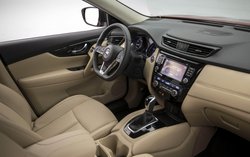
Adding to the interior comfort and convenience was a power panoramic moonroof, remote keyless entry, remote and push button start, cruise control, dual-zone automatic temperature control with second row HVAC vents, power windows with one-touch up/down, power door locks, power heated outside mirrors, carpeted floor mats and cargo area protector (option), day/night rearview mirror, outside temperature display, map lights, multiple beverage holders and three 12-volt accessory outlets.
Safety and Convenience
The 2017 Nissan Rogue SL Hybrid AWD came with safety and convenience features including eight air bags, blind spot warning, moving object detection, around view monitor, tire pressure monitoring system, electronic stability control, traction control system, hill start assist, active trace control, vehicle dynamic control and anti-theft vehicle immobilizer.
2017 Nissan Rogue Hybrid pricing, excluding the $940 destination and handling charge:
SV FWD $26,240
SL FWD $31,160
SV AWD $27,590
SL AWD $32,510
Warranties
The 2017 Rogue Hybrid comes with these warranties:
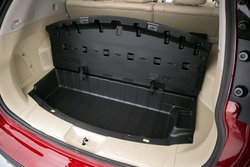
- Battery – 10 years/150,000 miles (CA, OR, WA, NY, CT, DE, ME, MA, NJ, PA, RI, VT))
- Battery – Eight years/100,000 miles (Remaining states)
- Basic – Three years/36,000 miles
- Drivetrain – Five years/60,000 miles
- Corrosion – Five years/Unlimited miles
- Roadside Assistance – Three years/36,000 miles
Observations: 2017 Nissan Rogue Hybrid AWD
The 2017 Rogue received both interior and exterior facelifts with updated styling, enhanced technology, safety features and improvements to NVH (Noise, Vibration and Harshness) reduction. Clean Fleet Report was a fan of the 2016 Rogue styling and feel Nissan did a good job with the noticeable but subtle changes for 2017.
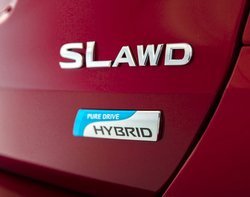
The 2017 Nissan Rogue AWD Hybrid offers clean styling, a spacious interior with convenient and desirable seating and storage flexibility. The biggest news is the all-new hybrid technology for the Rogue. The option of its availability in both front-wheel and all-wheel drive is a selling point for Nissan, as it means everyone looking for a compact SUV/crossover will find something to fit their driving needs and lifestyle.
Nissan’s direct competition for the Rogue runs about 14 deep. That list includes the top-selling trio of the Honda CR-V, Toyota RAV4 and Ford Escape. Of those that are both hybrid and AWD, the list is reduced considerably and for 2017 includes only the Toyota RAV4 Hybrid. Larger and luxury AWD hybrids include the Lexus NX 300h, Lexus RX 450h, Toyota Highlander, Nissan Murano, Infiniti QX60 and Audi Q5. Up until this year, the Subaru Crosstrek was also part of the group.
Whatever you buy, Happy Driving!
In order to give you, the reader, the best perspective on the many vehicles available, Clean Fleet Report has a variety of contributors. When possible, we will offer you multiple perspectives on a given vehicle. This comes under SRO-Second Road Test Opinion. We hope you’ll enjoy these diverse views–and let us know if you do or don’t.
Related Stories You Might Enjoy:
Road Test: 2017 Nissan Rogue Hybrid (Steve’s take)
Road Test: 2016 Toyota RAV4 Hybrid (Steve’s take)
Road Test: 2016 Toyota RAV4 Hybrid (Larry’s take)
Top 10 Best-MPG AWD Crossovers/SUVs
Road Test: 2016 Nissan Rogue
Road Test: 2015 Nissan Rogue
Road Test: 2015 Honda CR-V
Road Test: 2016 Ford Escape
Disclosure:
Clean Fleet Report is loaned free test vehicles from automakers to evaluate, typically for a week at a time. Our road tests are based on this one-week drive of a new vehicle. Because of this we don’t address issues such as long-term reliability or total cost of ownership. In addition we are often invited to manufacturer events highlighting new vehicles or technology. As part of these events we may be offered free transportation, lodging or meals. We do our best to present our unvarnished evaluations of vehicles and news irrespective of these inducements.
Our focus is on vehicles that offer the best fuel economy in their class. We also feature those that are among the top mpg vehicles in their class. In addition, we aim to offer reviews and news on advanced technology and the alternative fuel vehicle market. We welcome any feedback from vehicle owners and are dedicated to providing a forum for alternative viewpoints. Please let us know your views at publisher@cleanfleetreport.com.

22 thoughts on “Road Test: 2017 Nissan Rogue Hybrid AWD”